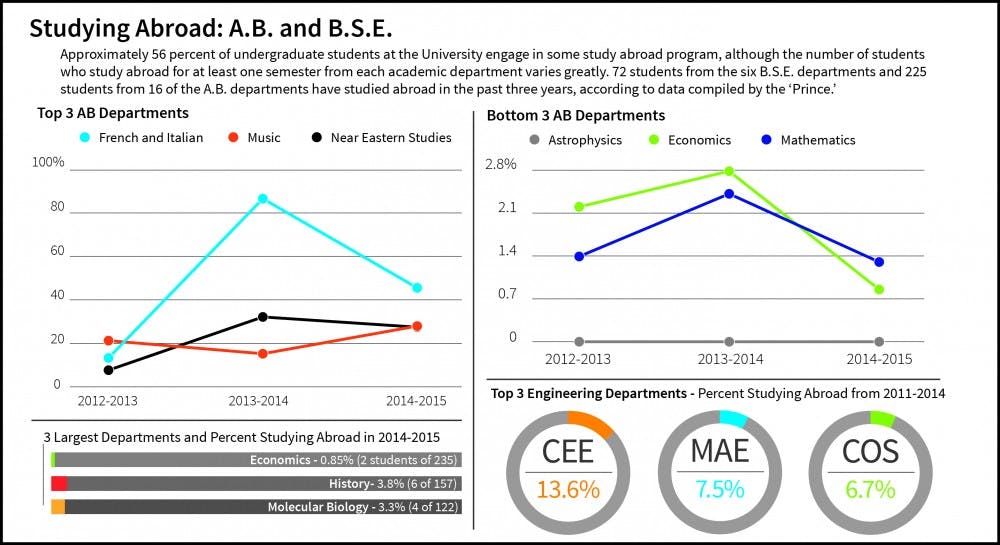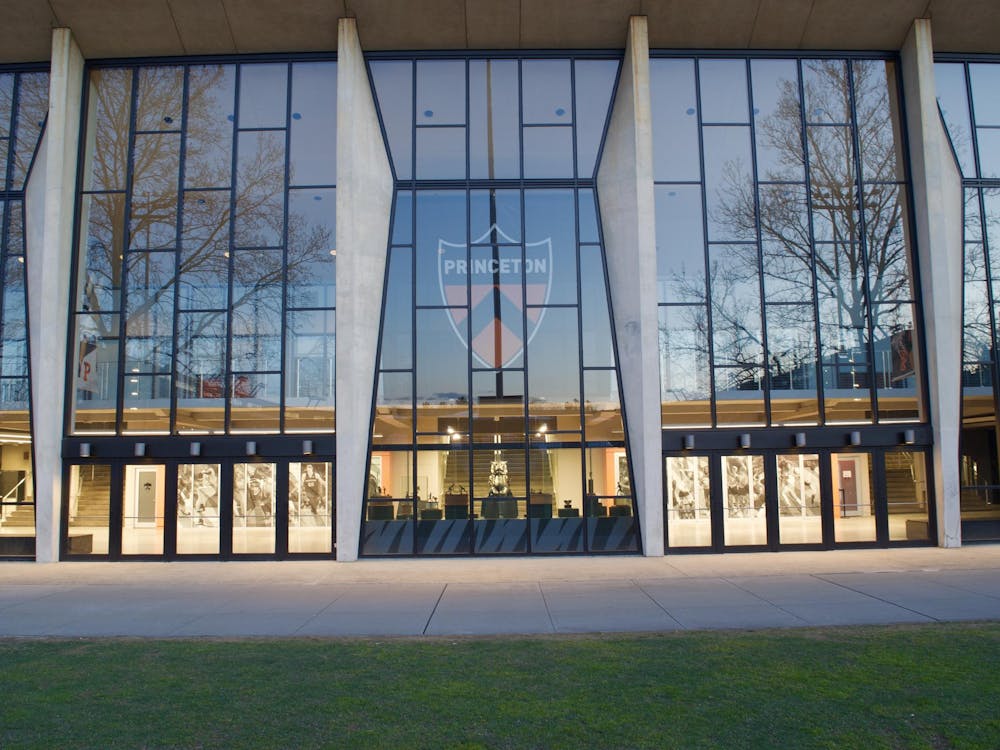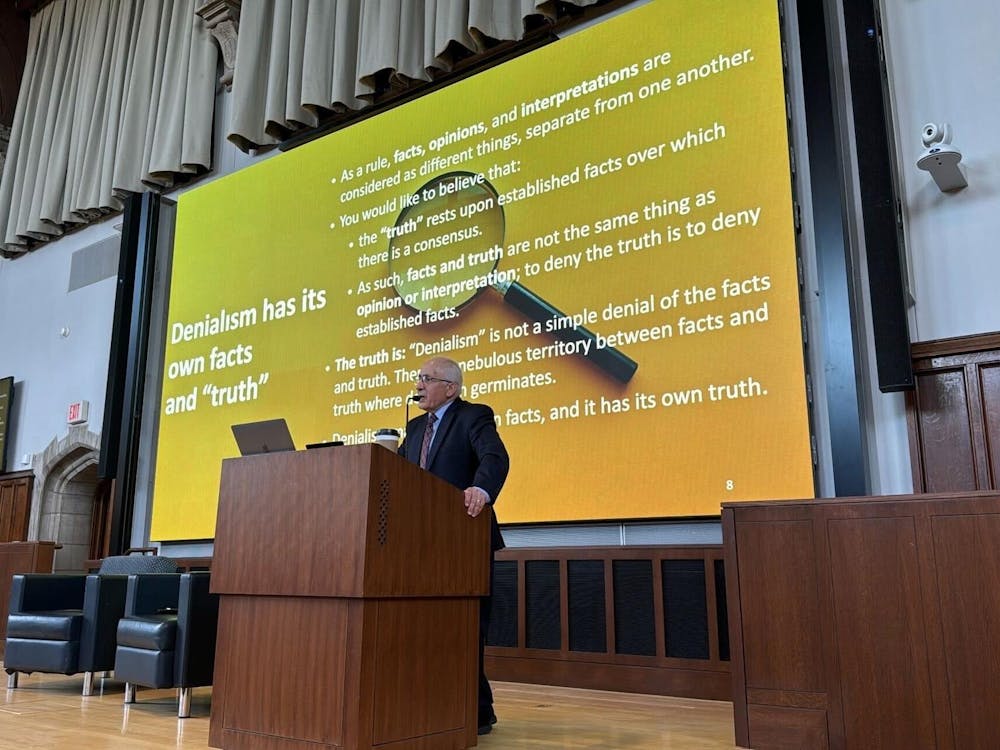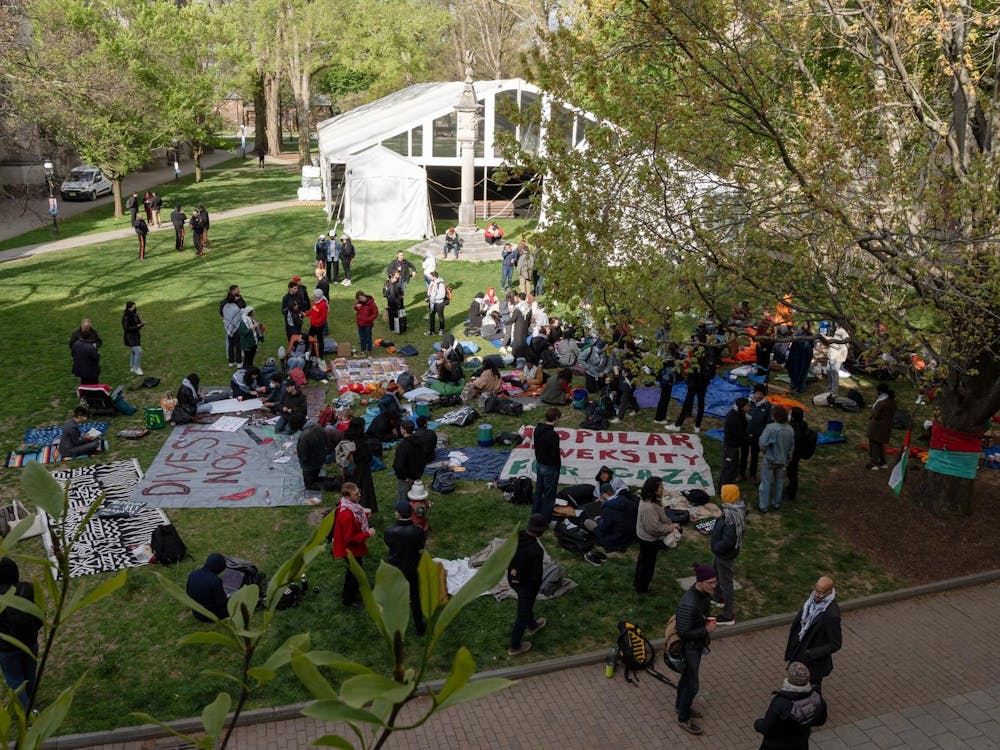Approximately 5.4 percent, or 72 of 1322 eligible B.S.E. students, studied abroad for at least a semester during the last three academic years.
The civil and environmental engineering department saw the highest proportion of students studying abroad, with 13.6 percent, or 15 of 110 students, while operations research and financial engineering as well as electrical engineering had the lowest percentage of students study abroad at 2.4 percent each.
All data was provided by School of Engineering and Applied Science Associate Dean for Undergraduate Affairs Peter Bogucki.
CEE undergraduate departmental representative Catherine Peters said she strongly encourages study abroad, as she believes that engineers must be prepared for work in a global environment.
She said junior spring is the most popular term for study abroad, as majors can take that semester's courses in other years or at many CEE programs worldwide. In contrast, Peters said that sophomore year CEE courses form the foundation for upperclassmen years, while junior fall courses are often unique to the University.
Students who study abroad may only do so during the spring of sophomore year, either semester of junior year, or senior fall. They may also be allowed to study abroad during sophomore fall.
Peters noted that many concentrators return from study abroad with a well-formed thesis topic in mind based on their foreign university's location, giving the example of a student whose professors in Brazil discussed the nation's environmental problems related to the air and water quality problems from drought and deforestation. The student is now incorporating the material into her junior independent work and plans to continue doing so for her thesis.
"That's exactly what we hope the students get out of their international experience, because civil and environmental engineering really is about the natural environment and the human-built environment. It's very much about place — place matters," Peters said, adding that study abroad is consequently more beneficial for CEE majors than for some other engineers.
7.5 percent, or 19 of 253 students, went abroad from the mechanical and aerospace engineering department. According to the MAE page on the Office of International Programs website, junior spring is the easiest term for concentrators to study abroad.
MAE undergraduate departmental representative Michael Littman did not respond to multiple requests for comment.
According to Bogucki,6.7 percent or 23 out of 342 B.S.E. computer science concentrators studied abroad during the three-year window. In contrast, COS department undergraduate coordinator Colleen Kenny-McGinley said that 2.9 percent or three out of 102 A.B. COS concentrators did so.

COS undergraduate departmental representative Brian Kernighan GS '69 said he supported study abroad for every discipline, noting that COS may be more flexible in allowing for overseas study than other engineering departments.
"We don't have that much depth because the field is younger, and so it's much more fluid, and therefore it's much easier to go abroad and find a course that is sort of loosely equivalent," he explained, adding that COS majors rely on laptops rather than any special equipment.
He estimated that at any given point, six to eight COS concentrators, including A.B. candidates, are studying abroad. The majority of majors participate for academic and cultural rather than language reasons.
Unlike the other department representatives, who cited only minor problems with the study abroad course approval process, Kernighan said that he always encounters logistical problems once the students go overseas.
"They get there and they discover that the course that they got approved isn't what they thought. It's been canceled, it's been changed, the schedule is in conflict with something else," he said. "And so then we have to do this long-distance rearrangement to say, 'Oh, well, you were going to take this course that would work, but how about this course?' It all works out in the end."
B.S.E. and A.B. COS concentrators probably study abroad with equal ease, according to Kernighan. While B.S.E. students have more course requirements, he noted that they only need to do one semester of independent work, so they can gain flexibility by opting not to do independent work while abroad. On the other hand, A.B. students need to coordinate more carefully to complete their independent work overseas.
The chemical and biological engineering department saw 2.5 percent or five of 204 concentrators spend at least one semester at a foreign institution. CBE undergraduate departmental representative A. James Link said sophomore spring and junior fall are the best and most popular times to study abroad.
Lawrence Chang '14, a CBE major who studied abroad his junior fall at Oxford, said everyone at the University encouraged him to go overseas. He noted that his B.S.E. status did not make study abroad inherently much more difficult.
"You have to be careful about, for example, your course counts, so that you have your 36 courses instead of your 32. And you've got to make sure that since engineering departments have a lot of requirements, you're satisfying those while you're abroad," he said. He added that majors in the humanities and social sciences often have greater academic incentives to study abroad than do natural sciences or engineering students.
For the most part, Link said that he has not seen study abroad affect the schoolwork or independent work of returning CBE students. Instead, he observed that they gain general enrichment from experiencing other cultures.
"A lot of times people want to do study abroad because it's just going to be fun, too," Link said. "They get to go to another place that they haven't been before, and it's a pretty unique opportunity, and to do that in your twenties, because once you have a real job, it's hard to go to another country for three months most of the time."
Seven of 286 ORFE concentrators, or 2.44 percent, enrolled in courses overseas during the three-year period.
ORFE undergraduate departmental representative Alain Kornhauser GS ’71 said that he approved of time abroad at academically comparable institutions such as Oxford or Cambridge, but he questioned the value of studying at less rigorous universities or at universities whose opportunities can be found at Princeton.
"Why should someone go spend one-eighth of their undergraduate experience at an institution that isn't even as good as their safety school when they were applying to schools?" he said. "And if they really want the safety school, why'd they come to Princeton? There are a lot of people who would love to be here. They took somebody else's place who wanted to be here and obtain the full eight semesters of the Princeton experience, which some of us think is a really good one."
From electrical engineering, three of 127 majors studied abroad, or 2.36 percent. Department representative Andrew Houck said that the department embraces the chance for students to have a significant international experience, especially if they want one.
He noted that to improve access to study abroad, the junior fall is designed to have the least requirements, and ones that are most easily found at other universities. Sophomore year and junior spring, however, conflict with introductory classes and core lab experiences, respectively.
Houck said ELE concentrators mostly pursue study abroad to experience a different academic or international culture.
Peters said CEE students primarily choose English-speaking countries because they want to study engineering courses in English. She explained that taking engineering in a foreign language could cause problems in later courses, such as if they misunderstand foundational material or learn terms in another language.
Even students fluent in a foreign language may struggle to learn technical language, which foreign language departments generally do not teach, according to Houck.
"My impression from talking to people more broadly than in-semester independent work is that people often want to go to a country that's not English-speaking as a country, but they get nervous when instruction is not in English, so they want English instruction in many non-English-speaking countries," he said.
Kornhauser said language immersion and immersion in a different culture can take place during the summer so as to not take away one-eighth of the Princeton experience. He also said that students wanting to attend another institution could do so for graduate school.
When students return from abroad, Houck said that he observes no major difficulties aside from brief moments of confusion that are easily fixed.
"They'll have had a slightly different experience than everybody here, so sometimes there will be courses that refer to some content in a required course that maybe someone learned a little differently, but those are relatively minor hiccups," he said. "And they're completely surmountable."
Similarly, Kernighan said that students who study abroad face no academic disadvantages when they return. Instead, their exposure to different ways of thinking about computer science, social interactions, and culture creates a net win.
"That's going to stand them in tremendous good stead in future life in a way that having a slightly stronger data structures course isn't," he said.
Bianca DiGiovanni '15, a CEE concentrator who spent a semester at the University of Auckland, said that she found it easy to study abroad as an engineer. Wanting to see the world outside New Jersey, she picked New Zealand because its citizens lead a greener, more carbon-sensitive lifestyle and speak English.
While she said that she did not learn much academically while abroad, she called the experience an amazing opportunity to learn about a different culture.
Both Chang and DiGiovanni recommended that other engineering students study abroad.
Editor's note: This article explores study abroad figures for students in B.S.E departments. To read about study abroad and A.B. students,click here.









